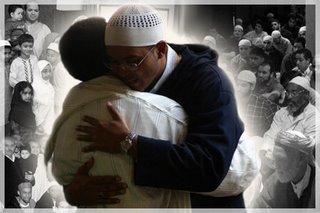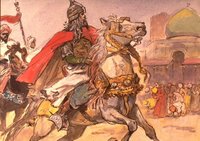Asalamualaikum,
Here is an answer taken off of SunniPath in regards to raising children. A very very very critical and important issue that parents should take heed of. The excerpt itself is taken from the Ihya Ulum al-Deen by Imam al-Ghazali (ra).
Q.Do you have any guidance from our ulema on how to raise children?A.
The following is from Imam Ghazali's: Disciplining the Soul (Kitab Riyadat al-Nafs), being Book XXI of Ihya' `Ulum al-Din (The Revival of the Religious Sciences) translated by T.J. Winter (Shaykh Abdal Hakim Murad)
NOW that the way in which young children are disciplined is one of the most important of all matters. A child is a trust in the care of his parents, for his pure heart is a precious uncut jewel devoid of any form or carving, which will accept being cut into any shape, and will be disposed according to the guidance it receives from others. If it is habituated to and instructed in goodness then this will be its practice when it grows up, and it will attain to felicity in this world and the next; its parents too, and all its teachers and preceptors, will share in its reward. Similarly, should it be habituated to evil and neglected as though it were an animal, then misery and perdition will be its lot, and the responsibility for this will be borne by its guardian and supervisor. For God (Exalted is He!) has said, Ward off from yourselves and your families a Fire. A father may strive to protect his son from fire in this world, but yet it is of far greater urgency that he protect him from the fires which exist in the Afterlife. This he should do by giving him discipline, teaching him and refining his character, and by preserving him from bad company, and by not suffering him to acquire the custom of self-indulgence, or to love finery and luxury, in the quest for which he might well squander his life when older and thus perish forever. Rather should he watch over him diligently from his earliest days, and permit none but a woman of virtue and religion to nurse and raise him; her diet should be of permitted things, for there is no blessing [baraka] in milk which originates in forbidden food, which, should a child be nourished on it, will knead his native disposition in such a way as to incline his temperament to wrongdoing.
When the signs of discretion appear in him he should again be watched over carefully. The first of these is the rudiments of shame, for when he begins to feel diffident and is ashamed of certain things so that he abandons them, the light of the intellect has dawned in him, whereby he sees that certain things are ugly, and different from others, and begins to be ashamed of some things and not others. [1]This is a gift to him from God (Exalted is He!), and a good foretoken that his traits will be balanced, his heart pure, and his intellect sound when he enters upon adulthood.
The child who has developed the capacity for shame should never be neglected; rather this and his discretion should be used as aids in his education. The first trait to take control of him will be greed for food; he is to be disciplined in this regard, so that, for instance, he picks up food only with his right hand, says 'In the name of God' when raising it, eats from that which is nearest to him, and does not start eating before others. [2] He should not stare at his food or at the other people present, neither should he bolt it, but should chew properly; he should not eat one mouthful after another without pause, he should not get food on his hand or his clothes, and he should acquire the habit of sometimes eating nothing but bread so that he does not think that the presence of other kinds of food is inevitable. He should be made to dislike eating large quantities by being told that this is the practice of animals, and by seeing other children reproached for overeating or praised for being well-mannered and moderate. He should be made to enjoy giving the best food to others, and encouraged to pay little heed to what he eats and to be contented with its coarser varieties.
He should be encouraged to like white rather than coloured or silk garments, and made firmly to believe that these latter are proper to women and to effeminate men, and that [true] men disdain them. This should be repeatedly emphasised to him so that he dislikes and criticises the wearing by any child he sees of silken or coloured clothes. He should be protected from children who are accustomed to luxury and comfort, and to wearing expensive garments, and from mixing with all who would speak to him of such things and thereby make them fine in his eyes. For the child who is neglected in the early years of his growth will usually grow up to be ill-natured, dishonest, envious, obstinate, inclined to theft, backbiting, and excessive chatter and laughter, and slyness and immorality, from all of which things he can be protected through a sound upbringing.
Next he should be busy at school learning the Qur'ân, the Traditions, and tales of devout men, so that love for the righteous may take root is his heart. He should be preserved from those varieties of poetry which treat of lovers and passion [3], and from the company of such men of letters as claim that these things are part of an elegant and sophisticated nature, for this would implant the seeds of corruption in his heart. Whenever a good trait or action manifests itself in the child he should be admired and rewarded with something which gives him joy, and should be praised in front of others; likewise, when once in a while he does something bad it is best to pretend not to notice and not to bring it to the attention of others (but never to reveal to him that it is something which others might be bold enough to do), particularly if the child himself has diligently endeavoured to hide his action, for the exposure of such deeds may cause him to grow emboldened, until he no longer cares when they are made public. Should he repeat the action, he should be privately reproached and made to feel that it was a very serious thing, and be told, 'Beware of doing anything like this again, or I shall tell others and you will be disgraced in front of them!'. He should not be spoken to at length every time, for this would accustom him to being blamed for his misdeeds, and destroy the effectiveness such words have upon his heart. A father should rather preserve the awe in which the child holds his speech by reproaching him only sometimes: similarly the mother, when reproving him should frighten him by [threatening to mention the matter to] his father. He should not be permitted to sleep by day, for this conduces to laziness, and should always be allowed to sleep at night, but not on a soft bed, which would prevent his members from growing tough. His body should not be allowed to grow fat, for this would make it hard for him to renounce self-indulgence; instead he should be habituated to rough bedding, clothing and food.
He should also be prevented from doing anything secretly, for he will conceal things only when he believes them to be ugly, and if he is left to continue these practices will grow used to doing ugly things. He should acquire the habit of walking, moving about and taking exercise for part of the day so the he is not overcome by idleness, and should be taught not to uncover his limbs or walk fast, and not to dangle his arms but to keep them close to his trunk. He must be forbidden to boast to his fellows about any of his parents' possessions, whether these be money or property, or about anything he eats or wears, or about his tablet and pencase, and should become used to being modest, generous and mild in speech to all with whom he associates. He should be prevented from accepting anything from other boys, if he is from a wealthy and powerful family, and be taught that it is honourable to give, and base and blameworthy to take; while if his parents are poor he should be taught that greed and taking from others is a disgraceful and humiliating practice fit only for dogs, which wag their tails hoping for a morsel.
Children should always be made to deem the love of gold and silver an unsightly thing, and should be warned in this regard even more vigorously than they are warned about snakes and scorpions, for the vice which consists in such a love is more dangerous to them (and to adults also) than poison.
A child should be put in the practice of not spitting, yawning or wiping his nose in the presence of others, and taught not to turn his back to anyone, or to cross his legs, or lean his chin and support his head on his hand, for these practices indicate the presence of sloth. He should be taught how to sit, and be forbidden to speak excessively, it being explained to him that this is a sign of impudence and the custom of children from low families. Making oaths of any sort, whether true or false, should be forbidden to him, so that he never acquires this habit as a child. He should be put in the habit of never speaking before anyone else, and of speaking only in response to questions and in proportion to them, and of listening properly whenever an older person is speaking, and rising [when he enters], and making a place for him and sitting facing him. He should be forbidden to speak loosely, or to curse or insult anyone, or to mingle with those who do such things, for these habits will inevitably be acquired should he fall in with bad company, the preservation from which is the very root and foundation of the education of children. If his teacher strikes him he should not cry out and sob, or seek anyone's intercession, but should rather bear his punishment, and be told that to do so is a mark of courage and manhood, while to cry is the practice of slaves and women.
After school, he should be allowed to play in a fashion which gives him some rest after his hard work in class, although he should not be allowed to grow exhausted. To prevent a child from playing, and to fatigue him with constant lessons, will cause his heart to die and harm his intelligence, and make life so hateful to him that he will cast around for some means of escape.
He should be taught to obey his parents and his teacher, and all people who are older than himself, whether relations or not, and to look upon them with respect and admiration and not to play in their presence. As he reaches the age of discretion he should not be excused the ritual ablutions and the Prayer, and should be told to fast for a few days during Ramadan, and should be prevented from wearing gold, silk or embroidered clothes. He should be taught about the limits [4] laid down by the Law, and put in fear of theft and unlawful gain, and also of lying, treachery, deceit, and all the other traits which tend to predominate among children. If he is brought up in this way, then as he approaches adulthood he will come to understand the reasons which underlie these things, and will be told that food is a means of maintaining health, and that its sole purpose is to enable man to gain strength for the worship of God (Great and Glorious is He!), and that this world is without reality, since it will not endure, and that death must bring its pleasures to an end, and that it is a place through which we pass but in which we cannot abide, unlike the Afterlife, in which we must abide and through which we cannot pass, for death awaits us at every moment, and that therefore the intelligent and insightful man will lay up provisions in this world for his journey into the next so as to gain a high degree in the sight of God and abundant bliss in the Gardens of Heaven. If his upbringing was sound, then when he attains to maturity these ideas will have a powerful and wholesome effect which will leave an impress on his heart like an inscription on stone; had it been otherwise, so that the child had grown accustomed to play, boastfulness, rudeness and insolence, and greed for food, clothes and finery, his heart will shrink from accepting truth in the manner of a field where crops wither because of its dry soil.
It is the beginning which should be supervised carefully, for a child is a creature whose essence is receptive to both good and evil: it is only its parents who cause it to be disposed to one or the other. As the Prophet said, 'Every child is born with the sound natural disposition [fitra]: it is only his parents who make of him a Jew, a Christian or a Zoroastrian'.
Sahl ibn 'Abd Allâh al-Tustarî said, 'When I was [only] three years old I used to say the midnight prayer, having watched my maternal uncle Muhammad ibn Suwâr doing this. One day he said to me 'Do you not remember God, your Creator?' and I asked, 'How should I remember Him?' 'When you put on your bedclothes, say in your heart three times, without moving your tongue, "God is with me. God beholds me. God watches over me". This I did for several nights, telling him what I had done. Then he instructed me to say the same words seven times each night, which I did, and then eleven times, upon which I felt a sweetness growing in my heart. When a year had passed, my uncle said to me, "Keep doing what I have told you until you enter your grave, for it will help you in this world and the next". I continued to do it for several years, finding a sweetness within myself, until my uncle said, "Sahl! If God is with somebody, and beholds him and watches over him, can he then disobey Him? You should never do so".
'Now, it was a habit of mine to keep my own company, and when they sent me to school I said, "I am afraid that my concentration will be lost". But they made it a condition upon the schoolmaster that I should be with him and study for a certain period each day, and would then come back home. And so I went to school, where I memorised the Qur'ân by the time I was six or seven years old. It was my practice to fast every day, my only nourishment for twelve years being from barley-bread. When I was thirteen I came across a question [which I could not answer], and asked my family to send me to Basra to search for the answer to it there [5]. When I arrived, I asked the scholars of that city regarding it, but not one of them was able to provide me with a satisfactory response. I journeyed therefore to 'Abbâdân [6], where I met a man named Abû Habîb Hamza ibn Abî 'Abd Allâh al-'Abbâdânî, who was able to answer my question. I then stayed with him for while, benefiting from his discourse and taking on some of his good manners, and then went back to Tustar [7]. Now I restricted myself in the matter of food to buying for one dirham a measure [8] of barley, which I would cause to be ground and baked, and of which I would eat one ounce [ûqiya] before dawn, without any salt or other food, so that that one dirham sufficed me for a whole year. Then I resolved to fast for three days at a stretch, and then break my fast, and then for five days, and then seven, and at last twenty-five days. This I did for twenty years. Then I went out, and wandered in the earth for several more years, and then returned to Tustar, where I prayed all night for as long as God willed.' Said Ahmad, 'I never saw him eat salt until he went to meet his Lord'.
Transcribed by Sr. Nosheen Mian.
Reproduced with written permission of translator
Notes:
1. According to Galen, the expressions of shame appear in the third year of life. (Rosenthal, Classical Heritage, 89.)
2. These practices being in conformity with the Prophetic Sunna.
3. Tusi (tr. Wickens, Nasirean Ethics, 168) names the poetry of Abu Nuwas and Imru'l-Qays as prime examples.
4. Ar. hudud, which may equally be rendered 'canonical punishment'.
5. The question, according to Ibn al-`Arabi (cited in Bowering, Mystical Vision, 48, and Chittick, Sufi Path of Knowledge, 407), was whether the heart itself could prostrate. Qushayri interprets the story as an indication that mysticism solves the problems that theology is unable to answer. (Bowering, loc. Cit.)
6. [`Abbadan, then situated on an island between the estuaries of the Tigris and the Dugail (=Qarun) River, was the site of a retreat (ribat) which was founded by the disciples of al-Hasan al-Basri (d. 110/728)' (Bowering, 47). It was frequented by important figures of both exoteric and esoteric Islam.
7. The home town of Sahl was located in Khuzestan in south-western Iran. Cf. J. H. Kramers, art. 'Tustar', in EI, IV. 393-5.
8. Ar. faraq, a large measure of grain, variously defined. (Cf. Lane, 2385.)










